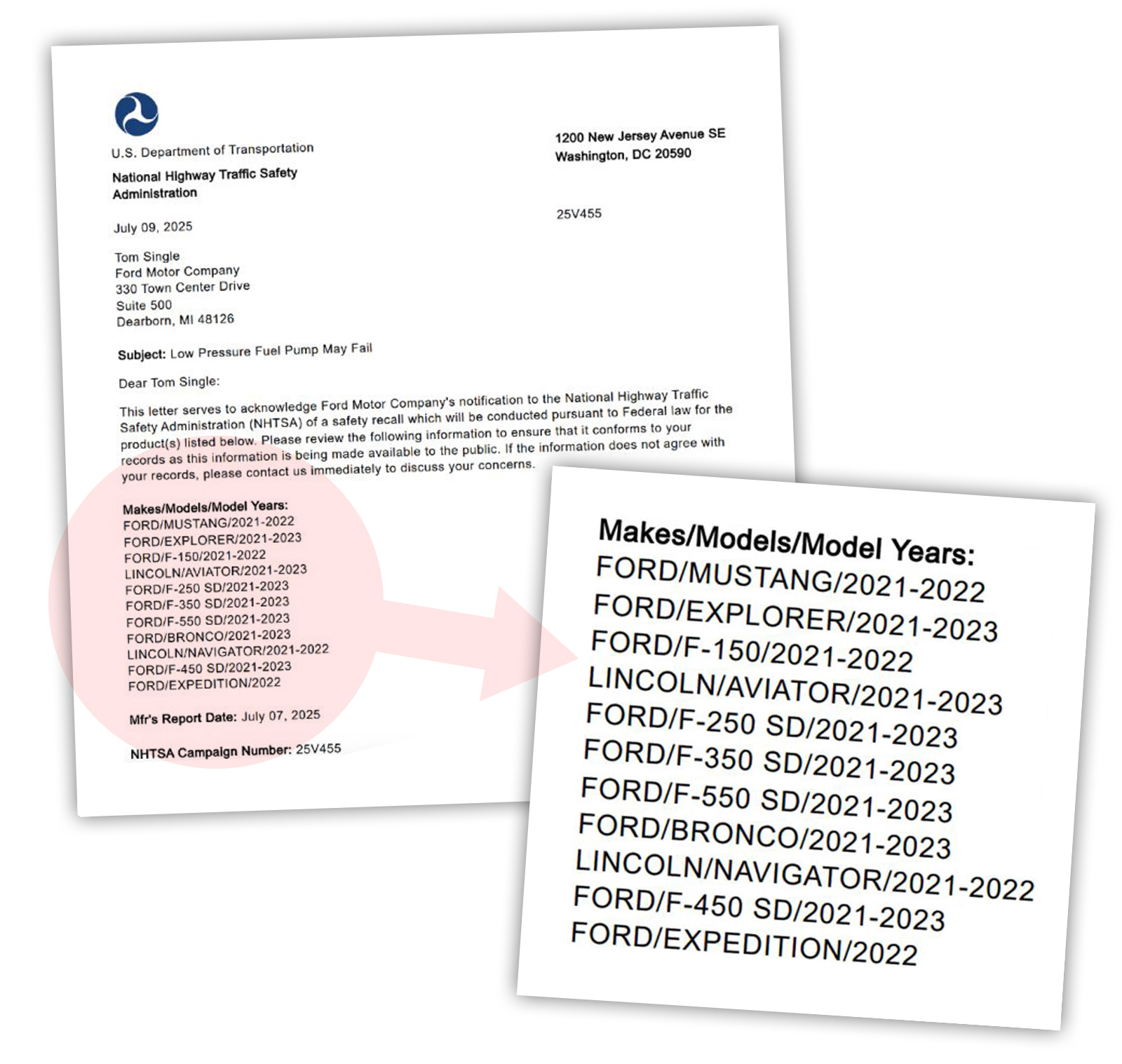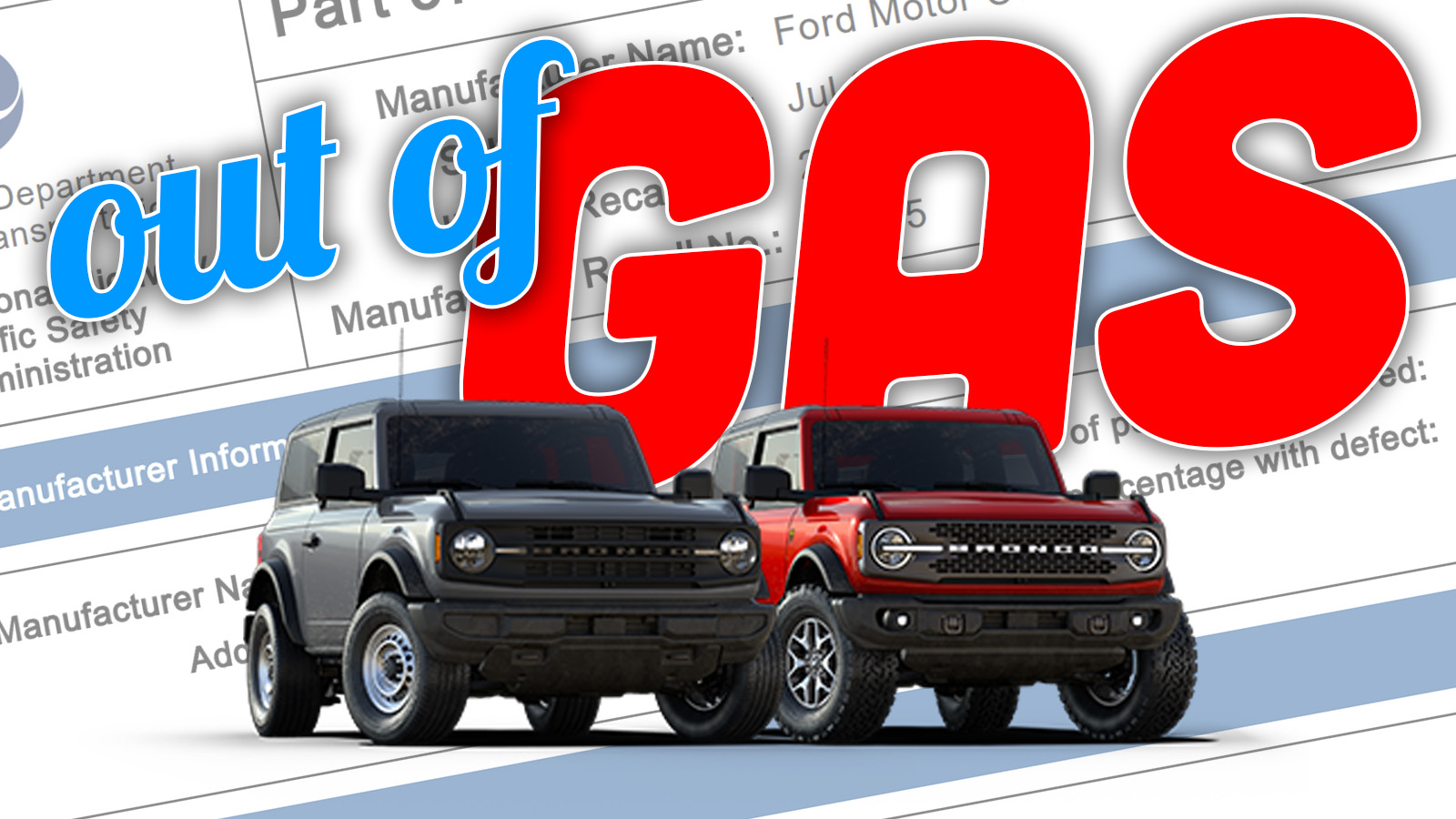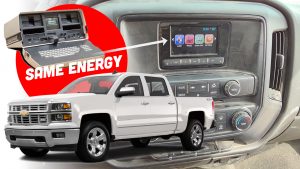According to a July 7th filing with the National Highway Traffic Safety Administration (NHTSA), Ford is recalling an absurd 850,318 vehicles due to a faulty fuel system. The overall list of affected vehicles is comprehensive.
At present, the affected cars range from model years 2021-2023 — anything built from July 1st, 2021 at the earliest to July 31st, 2022 at the latest. And the cars involved include, well, seemingly a bit of everything assembled during that time.
For the soccer moms and cops out there, your Explorer could be one that’ll soon be thirsty for fuel. For those who like to ride in a more premium SUV, you should take a look at your Lincoln Aviator and Navigator.
The sports car fans out there need to start worrying about their Mustang, while the outdoorsy ones among you should think twice about taking your Bronco out on trails; haulers and workers beware of fleets of F-150s, F-250s, F-350s, F-350s, and F-550s having issues — just about every engine you can get in each one. We’re talking the 2.7 liter to the 7.3.
Again, it’s comprehensive.

The issue here is that these cars are getting low pressure/flow from the fuel pump, which has the potential to make the engine stall mid-drive, increasing the risk of a crash in the process. The NHTSA Safety Recall Report breaks down the cause, saying:
Loss of fuel pressure and flow from the low-pressure fuel pump can be due to internal contamination of the jet pump, specifically in low fuel conditions, and reduced fuel pump internal clearances that result in an increase of internal friction and sensitivity to vapor lock.
There are a couple of warning signs that are listed on the recall that’ll maybe help owners get ahead of the issue before an issue, with the report including:
“Prior to fuel pump failure, the customer may experience poor engine performance (misfiring or running rough), a check engine light, or a reduction in engine power.”
Interestingly enough, the report adds that the failures are more likely to occur in a couple of situations, such as being in hotter climates, having low fuel, or simply “hot fuel conditions in the fuel tank.” What I’m hearing there is that I should make sure my friends and family back in Arizona have a full tank and are parking their car in the shade before those 100+ degree days come for their car like the Grim Reaper.

Unfortunately, this sadly isn’t a solution-oriented article, because there’s just not a solution at all yet; only the recall with no estimated repair on the docket. In the meantime, owners will just have to wait and hope that their fuel pump continues to cooperate until they’re told about fix for the fuel pumps.
As for how the issue was found, Ford’s Critical Concern Review Group (CCRG) started investigating the issue in September 2022 after warranty claims on the Fuel Delivery Modules started to pour in, but noted that “the rate of failures had decreased significantly after the supplier implemented several corrective actions from December 2021 through September 2022 to reduce contamination and production variation.” It seemed like case closed and that they successfully resolved the concerns, however, that clearly wasn’t the case. There’s a lot of very specific wording on how the rest of the investigation went from there, so here’s the word from the horses mouth itself:
Based on the available warranty data, Ford closed the investigation because the field data showed that the rate of failures was Part 573 Safety Recall Report 25V455 The information contained in this report was submitted pursuant to 49 CFR § 573 Page 7 of 9 low and the failure could be progressive in nature.
Ford was not aware of any accidents, fires, injuries or property damage attributed to failure of the FDM. On July 29, 2024, the National Highway Traffic Safety Administration (NHTSA) opened Preliminary Evaluation (PE) 24-019 in response to six consumer complaints alleging loss of motive power as a result of low-pressure fuel pump failure in 2021 MY Ford Bronco vehicles. Ford’s response was provided on September 23, 2024. On April 3, 2025, Ford’s Critical Concern Review Group (CCRG) opened an investigation to update the warranty claims, field reports and affected population associated with PE24-019.
On May 22, 2025, the CCRG determined that the number of warranty claims had increased during summer months and in warm weather states. Connected vehicle data was utilized to further understand the conditions, such as fuel tank fill levels and diagnostic trouble codes, leading to further understanding of the root cause. On June 9, 2025, the CCRG reviewed vehicle production dates for warranty claims to determine whether something had changed in the supplier’s manufacturing process.
The CCRG discovered that vehicles were all produced between July 2021 and July 2022. On June 9, 2025, through June 10, 2025, Ford Product Development (PD) and Ford Supplier Technical Assistance (STA) conducted a review of the supplier’s manufacturing process for the parts used on these vehicles. Ford found that the supplier had made changes to the jet pump process to accommodate an increase in build complexity in June 2021 and identified that a tier 3 supplier for the GEN 4.6 fuel pump pumping chamber was not statistically capable for internal clearances and utilizing the full tolerance range of the supplier specifications.
The low clearances resulted in an increase of internal friction and sensitivity to vapor lock beginning in early July 2021. As of June 6, 2025, 1,860 warranty claims (received from September 2, 2021 to May 31, 2025) have been identified related to the investigation. As of June 24, 2025, 28 field reports (received from January 5, 2022 to March 31, 2025) and 57 customer service reports (received from October 18, 2021 to May 22, 2025) have been identified related to the concern.
Vehicles produced from July 1, 2021, through July 31, 2022, have a projected fuel delivery module failure rate of 8.9 R/1000 at 10 years/150,000 miles of vehicle service. On June 30, 2025, Ford’s Field Review Committee reviewed the concern and approved a field action. Ford is not aware of any reports of accident or injury related to this condition.
As of the writing of this article, there haven’t been any reports of accidents or injuries related to the issue, and you can see the full list of cars and engines that are affected by reading the recall here.

The NHTSA document says that, of the total number of potentially involved — 850,318 — the estimated percentage with this defect is 10 percent. That’s over 85,000 cars. That’s like two years worth of Ford Mustang sales.
Still, good on Ford for recalling these things. It’s the right thing to do.









How is Farley still the CEO??? Ford’s been a trainwreck w/ him at helm.
Ford doesn’t use the metric system on their cars, so the headline should be corrected to an “Imperial Crap-Ton”.
Good to see the quality hasn’t improved since the 90s.
I love Ford’s ideas (Mav, Ranger, Bronco, aluminum F-150, etc) but terrible execution. That being said, not like Toyota is exactly knocking it out of the park these days. And my 2013 CRV (the reliable one before the CVT & Turbo) had its fuel pump replaced last year (150,000klms) and they still to this day refuse to recall the VTC actuator rattle. Good thing vehicles cost 60 grand these days or I would be worried we’re getting screwed.
Ford once again doesn’t want to be outdone by GM and their L87 6.2 V8 problems. Not everything is a competition Ford!
While they’re in there replacing the fuel pump they should just go ahead and drop in a new engine, transmission, brakes, A/C, steering rack and door latches. Get a head start on next years recalls.
What the hell is going on at ford? They finally have an amazing lineup of card and the poor quality is blowing it. Like its even bad quality for a ford!
With Ford’s record, there will be a recall for the recall in about 3 years, assuming it doesn’t take them 2 years just to get the replacement parts in the system.
It sounds like they’re trying to blame this Tier 3 supplier, but they aren’t saying the parts were out of tolerance. They seem to be saying the parts were within tolerance, but they were all at one end of the tolerance range. Then in hot weather/hot fuel conditions, the tolerance stack up is too tight and causes the pump to lock up.
So that to me sounds like a Ford/Tier 1/2 problem really. If your designed tolerance range allows the pump to seize up in normal operating conditions – your design is bad. If it’s not acceptable for the Tier 3 supplier to ship all of their parts at one end of the tolerance range, then the design needs changing, and your QA/QC departments should have stepped in before 800,000 units were shipped.
Here’s what I bet actually happened:
The worst part, is that Ford has already learned these lessons! Famously back in the 80s, they dual-sourced the same FWD automatic transmission from a Japanese company (maybe Mazda?) and one of their own plants in the U.S. The U.S. made transmissions had way more shifting complaints/problems than the Japanese-made transmissions.
It turns out that the Japanese-made transmissions had the valvebodies and valves more consistently in the middle of the tolerance band, while the American-made valvebodies while technically in tolerance, were at the extremes and often had issues with valves binding up.
If being at one end of your tolerance range leads to poor functioning, then you need to tighten up your tolerances. But American companies don’t want to pay for that, and would rather abuse their suppliers after the fact.
Ah! Welcome my fellow automotive supplier engineer!
Meanwhile, on Ford sales floors, they’re giving some motivational combination of “Brace yourselves” and “Coffee is for closers” speeches.
I still maintain that a recall like this, if done correctly and proactively, can turn a huge reputational ding into a win — not just for customer goodwill, but for sales of new vehicles.
The Foil Hat version is that there’s no real problem, they just want people to come in and buy cars ASAP.
How may imperial crap-ton units are there in a metric crap-ton unit?
More.
None, There is no imperial crap-ton, but rather there are 3.2 metric crap-tons in an imperial shit-ton, which is the closest unit of measure. Don’t get me started on the conversion to shit-tonnes though, that just gets too complicated.
How many metric crap-tons are in a metric fuck-ton?
100, just move the decimal. Yay metric!
Ahh, good point, I didn’t think of that.
It goes like this: truck load, crap ton, shit ton and mother load.
Is it an ISO standard metric crap-ton?
My ’10 Focus has this or a very similar problem – took me a long time to realize it was vapor lock I was experiencing as I thought that wasn’t a thing anymore.
Only happens when it’s beastly hot out and there’s less than a quarter of a tank, and after sitting for about 15 min it clears and the car’s normal again, but it’s kinda annoying.
“identified that a tier 3 supplier for the GEN 4.6 fuel pump pumping chamber was not statistically capable for internal clearances and utilizing the full tolerance range of the supplier specifications.“
So, the the parts were made within tolerances, but the tolerances were pretty loose, and no attempt was made to match the parts by size?
Seems written by blame shifting lawyers. Who was responsible for for making sure parts that were in spec actually fit together?
Porsche had tolerances that their suppliers could not meet, but they would measure and sort the pistons and cylinders , for example, so that they matched.
The tier 3 wasn’t statistically capable. So it’s their fault. I’ve worked at a tier 2, and they learnt process control from a wall chart (and sometimes made up data so it looked right), so a tier 3 not being capable is not a shock.
The tier 2 supplier’s SQA department didn’t spot this. So it’s their fault.
The tier 1 supplier’s SQA team didn’t spot this. They are probably design responsible too. A tolerance stack on a complex assembly relies on statistical variation of capable processes, if all the parts are right up at one end of the tolerance you get a huge increase in issues. You can design to an absolute tolerance stack, but then even if the tolerances are possible they make the parts way more expensive. So it’s their fault.
Ford bought parts that should have been good. All they did wrong was put huge financial pressure on their supplier base and not validate vehicle systems in a combination of hot climate and low fuel. So it’s their fault.
So there you go: everyone involved was responsible.
IMHO: I would argue this is likely, wholly, in T1’s hands as they’re typically responsible for form/fit/function at that level before it gets to the OEM.
T3 may be innocent, as they were likely down to individual parts supply (e.g. plating, machining, or molding) with the T2 doing partial assembly to the T1’s specification. To claim T3 is not statistically capable is misdirection: especially if they’re supplying piece parts within print tolerance (I’m sure this is what their contract stipulates).
However, if there was no assembly-level drawing tolerance to catch this, and a functional test to validate proper assembly, then T1 is to blame. Caveat being that if T2 didn’t check those functions, but they’re on the print, then T2 is to blame but T1 will likely bear the brunt of the OEM.
Yeah I misread that as the parts were within tolerances that were too broad.
“and utilizing the full tolerance range of the supplier specifications”
Would be clearer as
and exceeded the tolerance range of the supplier specifications.“
Still think it was written or at least edited by lawyers.
My camera repairman used to have a set of little hammers on his bench. They were for repairing Leicas which both had and needed lots of adjustment to finaly tune for best performance.
The Japanese cameras were manufactured and designed around statistical quality control so you could take a couple Pentaxs apart mix the parts, put them back together and they would probably work as well as before.
Leicas were all slightly different, but the factory kept records for each camera and they were very durable because you could get them back in tolerance with a hammer
Zeiss just used thread locking compound on the high end cameras to make sure they couldn’t be repaired only replaced, which is why nobody collects and uses old Zeiss cameras
Sometimes you want accurate, sometimes you want precise, but they aren’t the same thing.
I you started counting each number, out loud, to 850,000, you’d probably never make it there before you died.
As long as you aren’t a terminal cancer patient or something you should be able to manage.
Giving yourself 3 seconds per number it winds up taking just short of a month nonstop. 1.5 months if you want to sleep 8 hours a night.
I am glad there’s folks out here to do the math. I felt compelled to check the numbers and mine agree with yours. The chance that TWO, obviously brilliant Autopians are both wrong is as near to zero as you can get.
When I was a kid I had a really cool book about visualizing how big a million, billion, and trillion were and one of the ways was calculating how long it would take to count to each. So I knew it had to be fairly reasonable.
I remember that book!!! I didn’t own a copy but think I borrowed it from the school library or something.
As my friends group was entering our 30s, I wrote a mini program to calculate the date when all my friends would cross over 1 billion seconds. It’s like 31.2 years, if I remember correctly.
LOL this debate is awesome.
We have the book discussed below and I’ll look at its time estimates and report back. I think 3 seconds is too fast though.
Time yourself saying, e.g., “three hundred and forty seven thousand eight hundred and seventy nine” back to back to back to back and see how long it takes – I’m closer to 4 seconds, and that’s not accounting for time between numbers, mental fatigue, unavoidable slip ups when your are getting into very large uncommonly said numbers, etc…
3 seconds would be an average because a lot of numbers take less than that to say like “ten” or “two thousand”
My son and I rented a late-60s Alfa Romeo Duetto for a day in Tuscany a couple of weeks ago. Wonderful car until it stopped, blocking the road into and out of Montalcino. it was a fiercely hot day, the car had just climbed the big hill into town, and it was dark blue. Dual Weber carbs. We eventually got it rolling downhill to a safe place. The issue was later diagnosed as vapor lock. The guy who rented it to us said ‘you would have been just fine if you had poured cold water on the fuel pump’.
I thought fuel injection had banished this problem. Guess not.
At least you’d have been able to pour the water on it; contemporary car placement means you have to sit and wait for it to cool on its own.
Not good at stats, but isn’t it “8.9 R/1000 at 10 years”, I don’t know what R is but that looks like .89 %. Still a lot.
If this is Ford focusing on quality gains this year (per Farley’s words), I’d hate to see what would happen if they didn’t try.
But it sounds like the supplier designed the part, and they are at fault. Same thing with the Focus RS head gasket: supplier sent the wrong ones
To be fair to Farley, this supplier issue was back in 21′-22′ before he said he was going to focus on quality.
I guess recalling these counts as quality, if the fix ends up being a free fuel pump replacement.
This is exactly what should happen when a renewed focus on quality is implemented in an organization that is known to have quality issues. Its just like some 12-ish yrs ago the Army said “we’re going to change our culture so that sexual assault and harassment isn’t tolerated! We expect the numbers of cases to go up before down because right now they are going unreported.”
I believe that Hegseth has reversed this policy, starting with himself…
Sad but true.
I believe those are reported out via Signal
Well, then they’d all just be…
“Livin…in a…VAN…DOWN BY THE RIVER!”
Sounds like the fix is replace all the fuel pumps? Similar to GM recalling all the Bolts and replacing the batteries, while they’re in there give the whole thing a once over, Ford can’t seem to get away from recalls.
Wouldn’t want to be the cat who has to field 850,000 recall inquiries.
I was thinking I didn’t want to be the engineer or on the engineering team responsible for the design!
Ford should put an actual cat in charge of processing the inquiries, since cats are great at ignoring humans’ complaints.
Maybe a Nazi AI cat.
Sounds about right. The only things stopping cats from committing genocide are a lack of thumbs and their inability to cooperate with each other.
*taking delivery of a Mach E in a week voice* Haha I’m in danger.
I’d like to say the EVs are safe from fuel pump recalls but Ford…ah…finds a way. /Goldblum
Possible flux capacitor overheat situation?
Just a minor ‘thermal runaway event’ potential, totally fine, just you know, park away from…things.
I just read that in Jeff Goldblum’s voice, and it so totally works
Hey, they could pull a Hyundai where the charge controller isn’t up to the task. Although I’d trust the local Ford dealer more than the local Hyundai dealer. Those jerks just might let a customer take a test drive in a customer’s car.
I’d trust the guy selling kidneys out of an Igloo cooler behind the gas station more than I would a Hyundai dealer.
I trust our local Kia dealer more. That franchise is owned by a dealer group who aren’t terrible.